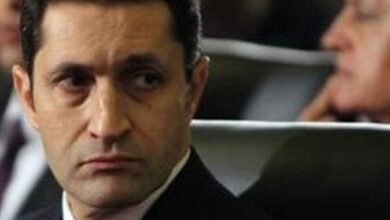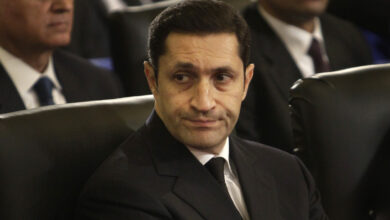A group of lawyers representing the families of those killed in the 25 January uprising have filed a request with the Cairo Appeals Court for the replacement of the judge overseeing the trial of former President Hosni Mubarak, who stands accused of conspiring to kill protesters.
In a press conference on Sunday, Abdel Aziz Amer, a lawyer representing civil claimants in the case, said: “We [the plaintiff’s lawyers] have reached the conclusion that Judge Ahmed Refaat is overseeing the case in an arbitrary manner. He is putting obstacles before us.”
The Cairo Appeals Court will start deliberating the lawyers' request on Tuesday. Judge Refaat, after being notified by the lawyers of their request, adjourned Mubarak's trial until 30 October. If a new judge is appointed in place of Refaat, the trial would be started again from scratch.
The press conference was scheduled to take place in a branch of the Lawyers’ Syndicate at the Cairo High Court, but journalists were forced to leave the room after being bullied by a group of lawyers.
The press conference took place later on the staircase outside the Cairo High Court.
On Saturday, Egypt’s de facto ruler, Field Marshal Hussein Tantawi testified in the trial under a media blackout, and, according to Amer, under tight security measures that prevented the majority of the plaintiffs’ lawyers from entering the courtroom.
Amer also said that the lawyers were prevented from questioning Tantawi, who was Mubarak's defense minister for two decades.
In the testimony, which reportedly took around 40 minutes, Tantawi answered 10 questions raised by the judge. The two questions submitted by prosecutors were rejected as being repeated questions.
Amer said: “This is a justifiable reason to ask Cairo Appeal Court to change the judge. … We are seeking justice, and we are not the one to blame in making the trial take longer,” said Amer.
“The judge for no reason allowed Tantawi to have his bodyguards present inside the courtroom,” Amer said. “[The bodyguards] beat one of the plaintiff’s lawyers and the judge didn’t say anything about this unprecedented attack against lawyers.”
Sameh Ashour, a prominent lawyer and the former head of the Lawyers Syndicate, said at the press conference: “Plaintiff’s lawyers were subjected yesterday to harsh security checks. They were treated badly, they were humiliated. That’s not a fair trial.”
After Refaat was announced as the judge overseeing Mubarak’s trial, local commentators welcomed the judge due to his reputation for fairness and impartiality.
Refaat, who is due to retire June 2012, has issued many verdicts against members of Mubarak's regime. In 2005, he sent a former leader of the now dissolved National Democratic Party, Abdullah Tayel, and 18 other defendants to jail on corruption charges.
In another case, he ordered the release of 16 defendants affiliated with Muslim Brotherhood.
Commentators believe that Tantawi’s testimony is crucial to answering the key question of whether or not Mubarak himself ordered the use of live ammunition to disperse peaceful protesters during the demonstrations that lead eventually to his ouster.
In the protests, more than 800 people were killed and thousands were injured, according to the Health Ministry.
A 17 May communiqué from the ruling Supreme Council of the Armed Forces alleged that military commanders refused orders to shoot protestors. Some believe that the military made the statement in order to bolster support by distancing itself from the ousted regime.




